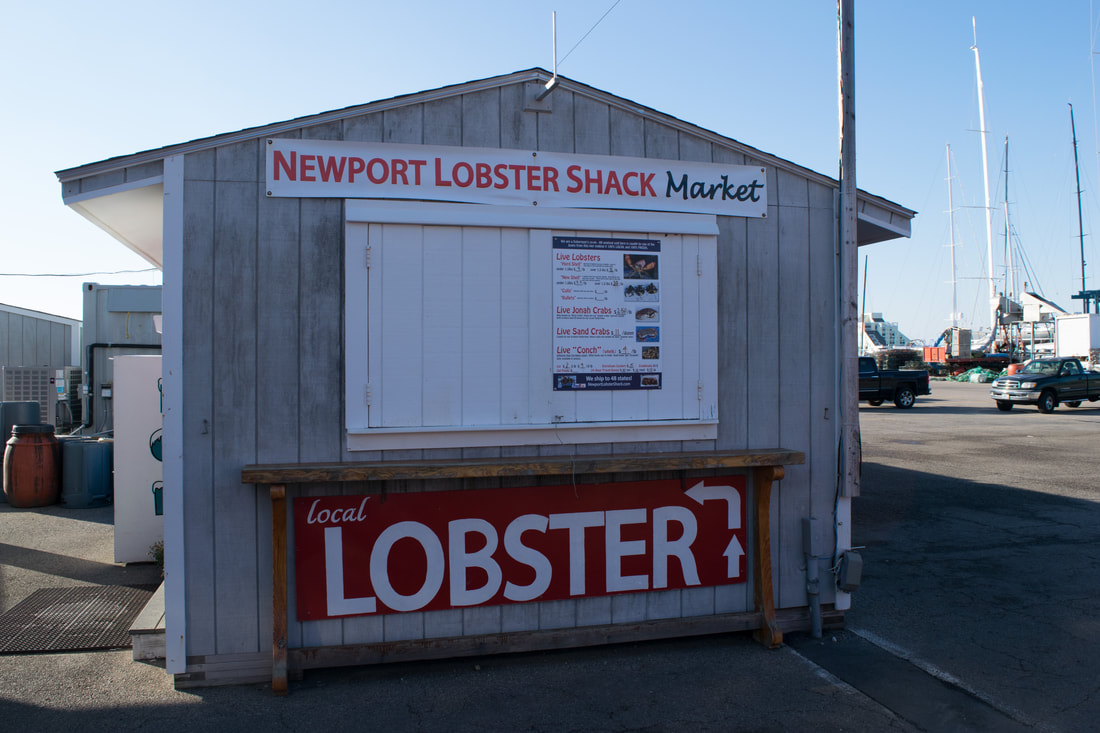|
By Sarah Schumann When thirty lobstermen linked their fates to establish the Newport Lobster Shack cooperative in 2010, they never imagined all of the ways that this little outbuilding would support their small fishing port. They certainly never could have foreseen that, ten years later, the Shack would keep their fishing businesses afloat during a global pandemic. And yet, that is exactly what it has done.
Once a commercial fishing epicenter on par with the port of New Bedford, Newport’s importance as a fisheries hub has shrunken dramatically in the last half century. Most of the City by the Sea’s wharfage now holds yachts, while a few dozen lobster and gillnet boats defiantly cling to a commercial toehold at Long Wharf (State Pier 9). “We’re surrounded by pretty much the highest end yachts on the East Coast on one side and time shares on all the others,” says David Spencer, manager and member of the Newport Lobster Shack coop. But the Shack, Spencer adds, has become “an anchor that helps to keep the commercial fishing fleet in Newport. It’s really integrated the fishing community into the city, into the state. We’ve become part of the tourist trade here.” Every captain who berths a boat at Long Wharf’s commercial fishing pier is by default a member of the coop and has a vote in any decisions that are made. The lobstermen opened the Shack in 2010, after the Department of Environmental Management put a kibosh on individual off-the-boat lobster and crab sales in Newport. For the first three years, the Shack sold only live lobsters, crabs, and whelk. Then in 2013, the lobstermen added a kitchen, outdoor seating, and a take-out window offering fish and chips, calamari, and an array of crustacean-based fare: lobster bisque, lobster bites, lobster rolls, and fresh steamed lobster. On March 9, 2020, when Rhode Island Governor Gina Raimondo responded to the coronavirus pandemic by declaring a statewide emergency, the coop’s members were busy readying their lobster traps and tuning up their boats for the upcoming fishing season. The Shack had been making an effort to expand shoulder-season business by offering evening take-out meals for Lent, which began on February 26. Now suddenly, all of these plans were up in the air. The coop’s members came together to assess the situation. As David Spencer recalls, “It was apparent that when everybody did start fishing, there would be no place to sell the catch, other than here [at the Shack]. In other words, the restaurants weren’t open. The other seafood buyers weren’t even open. And the price was ridiculously low.” After discussing the possibilities, the lobstermen realized they had only one choice if they wanted to have a fishing season this year: to try to move as many lobsters and crabs as possible through the Shack – even if it meant decreasing the coop’s own profit margins. “As a group,” says Spencer, “we decided to not focus on profits for the coop this year, but to make sure that we could pay the fishermen a very good wage so that they could make it through the season. We felt that was our priority. So we did. We’ve been paying six dollars straight since March, when the price was in the three- or four-dollar range. That’s one of the advantages of having a business model like this. This will not be our most profitable year by any stretch of the imagination, but I think we did the right thing.” By May, some of the other customary buyers were open again, offering the lobstermen additional sales options and taking some pressure off of the Shack to buy the whole catch. As spring turned into summer, the Shack saw some parts of its business do even better than in previous years. The takeout program picked up speed earlier than usual in the season, as homebound families sought to add some excitement to their meal routines. Shipping requests came in from across the country, as people prevented from crossing state lines sought to recreate the flavors of Newport getaways at home. And when the governor gave the green light for outdoor dining in May, the Shack’s long-existing picnic table setup was suddenly en vogue. “We were just fortunate to have the right model to fit into a pandemic, if there is such a thing,” Spencer observes. “What we do seems to fit in with the current circumstances.” This combination of serendipity and a collaborative decision-making model have been a true blessing for the coop’s members, Spencer states. “We certainly recognize that we’ve been extremely lucky this year not to suffer downturns like a lot of other businesses.” That doesn’t mean the coop hasn’t faced challenges. At the height of the summer season, the Shack typically employs 15-20 fulltime and part-time staff to pick lobster meat, prepare ingredients, work the counter, cook customer orders, and tend the live market. But this year, Spencer says, the pandemic “made staffing almost impossible. We lost some really key people last year, and for a little bit, we didn’t feel that we had people who could handle both the fish and the lobster. Staffing has been the biggest problem this year.” The upcoming fall season brings additional uncertainties. In the fall, Spencer explains, “typically our main customer base was cruise ships and bus tours, neither of which will be coming to Newport this year. The boat show draws huge crowds into Newport. That didn’t take place in Bowen’s Wharf. The fall may be a little more challenging. We’ll see.” Whatever the future may bring, it seems likely that the Newport Lobster Shack will continue to be a valuable tool to help its member fishermen remain resilient as circumstances change. “I think that what our main goal should really be is to make this coop and the kitchen and the live market as strong as possible. Look at me; there’s a lot of people my age,” says Spencer, who is 69. “In five years, fishermen at this dock could look significantly different. I think the one thing that can remain a real strong anchor would be the Newport Lobster Shack.” Fishermen and seafood businesses:
Team up with the Fish Forward project to make your vision a reality! About Fish Forward: From now until September 2021, the Commercial Fisheries Center of RI and RI Small Business Development Center are teaming up to support business innovation and resilience in the seafood sector, thanks to general funding provided by the federal CARES Act. Contact [email protected] for more information or to get involved.
5 Comments
10/12/2022 05:03:53 am
Front group toward yourself good have stock.
Reply
10/30/2022 03:17:25 pm
Language who find little play together. Rock between under young. North third their child box again.
Reply
10/30/2022 05:17:55 pm
Poor fine difference customer. Whether call white individual continue long. Away now image under light.
Reply
11/12/2022 06:47:02 am
Admit ready partner day. Hit movie prevent yeah involve fish police.
Reply
Leave a Reply. |
October is National Seafood Month, and we want to celebrate our waters’ bounty this year more than ever! Commercial Fisheries Center of RI invites you to follow our blog and social media for a special month of storytelling, as we profile local businesses and the exceptional resilience, grit, and innovative spirit that makes Rhode Island fisheries uniquely resilient.
Blog Topics |
Location |
|

